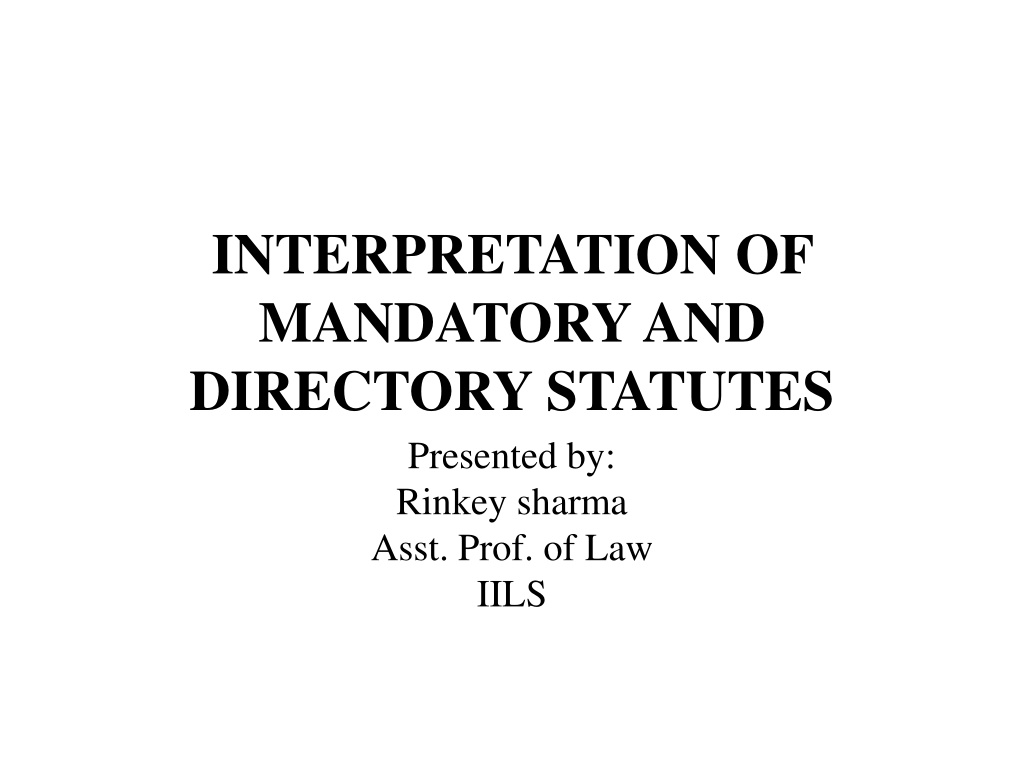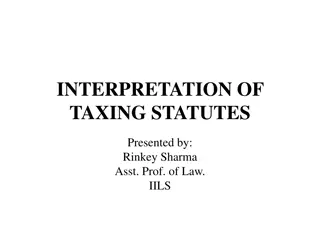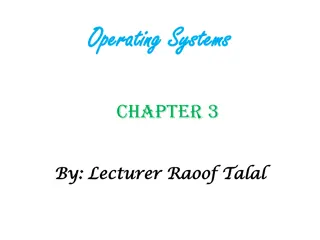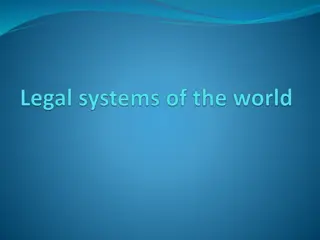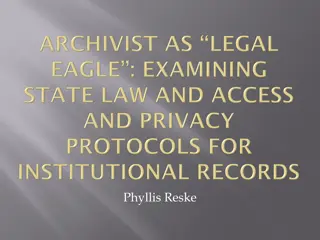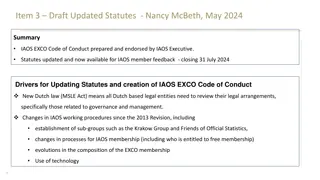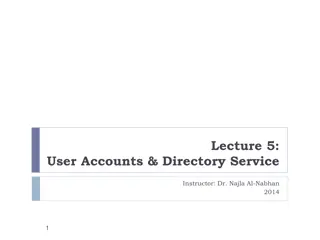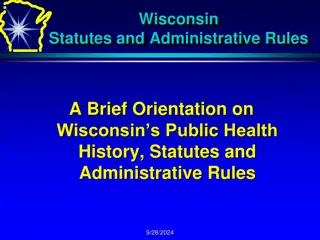Understanding Mandatory and Directory Statutes: A Legal Overview
Mandatory statutes compel specific actions with no discretion allowed, making non-compliance potentially void. Directory statutes outline procedures without affecting substantial rights, with compliance regarded as a matter of convenience. The interpretation of these statutes rests on legislative intent and consequences of interpretation on the law's purpose.
Download Presentation

Please find below an Image/Link to download the presentation.
The content on the website is provided AS IS for your information and personal use only. It may not be sold, licensed, or shared on other websites without obtaining consent from the author. Download presentation by click this link. If you encounter any issues during the download, it is possible that the publisher has removed the file from their server.
E N D
Presentation Transcript
INTERPRETATION OF MANDATORY AND DIRECTORY STATUTES Presented by: Rinkey sharma Asst. Prof. of Law IILS
MEANING OF MANDATORY AND DIRECTORY STATUTE Classification of statutes with reference to method: 1. Mandatory statute 2. Directory or discretionary statute Mandatory statute: A mandatory statute is one which compels performance of certain things or compels that a certain thing must be done in a certain manner or form. It is a statute which leaves nothing to the discretion of the Court in respect of compliance with its terms. Mandatory statute relates to matters of substance, affects substantial rights and is very essence of the thing required to be done. A mandatory provision in a statute is one which if not followed renders the proceeding to which it relates illegal and void.
Directory statute: A directory statute is an enactment of a legislative body that indicates only what should be done, with no provision for enforcement. The provisions of a directory statute are matter of form only and do not affect any substantial right, and do not relate to the essence of the thing to be done, so that compliance is a matter of convenience rather than substance. The strict fulfillment of directory statute is not necessary to the validity of a proceeding, but with which there is a duty to comply as nearly as practicable.
INTERPRETATION OF DIRECTORY AND MANDATORY STATUTES There is no universal rule as to when may a statutory provision can be regarded as merely directory and when mandatory. It is the duty of courts of justice to try to get at the real intention of the Legislature by carefully attending to the whole scope of the statute to be considered. The Supreme Court of India has pointed out on many occasions that the question as to whether a statute is mandatory or directory depends upon the intent of the Legislature and not upon the language in which the intent is clothed. The meaning and intention of the Legislature must govern, and these are to be ascertained not only from the phraseology of the provision , but also by considering its nature, its design and the consequences which would follow from construing it the one way or the other.
In the case of statutes that are said to be imperative (mandatory), the court have decided that if it is not done, the whole thing fails and the proceedings that follow upon it are all void. On the other hand, when the courts hold the provisions to be directory, they say that although such provisions may not have been complied with, the subsequent proceedings do not fail. Hence, no universal rule can be laid down, while construing statutes, mandatory enactments should be considered directory, or obligatory nullification for disobedience. to determine whether with an implied
The Supreme Court of India has been stressing time and again that the question whether statute is mandatory or directory is not capable of generalization and that in each case the court should try and get at the real intention of the legislature by analyzing the entire provisions of the enactment and the scheme underlying it. In DA Koregaonkar v State of Bombay AIR 1958 Bom 167 it was held that, one of the important tests that must always be employed in order to determine whether a provision is mandatory or directory in character is to consider whether the non-compliance of a particular provision causes inconvenience or injustice and, if it does, then the court would say that, the provision must be complied with and that it is obligatory in its character.
RULES FOR DETERMINATION OF MANDATORY AND DIRECTORY STATUTE Intention of the legislature: In determination of the question, whether a provision of law is directory or mandatory, the prime object must be to ascertain the legislative intent from a consideration of the entire statute, its nature, its object and the consequences that would result from construing it in one way or the other, or in connection that with other related statutes, and the determination does not depend on the form of the statute.
In Hari Vishnu Kamath v Ahmad Ishaque AIR 1955 SC 233, the Supreme Court observed that the various rules for determining when a statute might mandatory and when directory are only aids for ascertaining the true intention of the legislature which is the determining factor, and that must ultimately depend upon the context. An enactment, mandatory in form, might in substance be directory. The use of word shall does not conclude the matter. be construed as
PURPOSE BEHIND THE STATUTE: In Chandrika Prasad Yadav v State of Bihar (2004) 6 SCC 331, it was held that, the question as to whether a statute is directory or mandatory would not depend upon the phraseology used therein. The principle as regards the nature of the statute must be determined having regard to the purpose and object the statute seeks to achieve. If an object of the enactment is defeated by holding the same directory, it should be construed as mandatory; whereas if by holding it mandatory serious general inconvenience will be created for innocent persons of the general public without furthering the object of enactment, the same should be construed as directory.
In Aeron Steel Rolling Mills v State of Punjab AIR 1960 Punj 55, the question before the court was whether section 33B of the Industrial Disputes Act 1947, which empowered the State Government to transfer a proceeding under the Industrial Disputes Act from one Tribunal to another, was mandatory or directory. The relevant portion of the provision read as follows The appropriate Government may, by order in writing and for reasons to be stated therein withdraw any proceeding under this Act pending before a Labour Court, Tribunal, or National Tribunal and transfer the same to another Labour Court, Tribunal or National Tribunal, as the case may be, for the disposal of the proceeding . The Court observed that the provision empowered the Government to transfer cases from one tribunal to another and specified the manner in which the power shall be exercised. The provision required the government to specify the reason on which the order of transfer was based with and was not related to the essence of the thing to be performed and compliance with its terms is a matter of convenience rather than of substance.
The Court held A failure to comply with this provision is not likely to result in any injury or prejudice to the substantial rights of interested person, or in the loss of any advantage, the destruction of any right or the sacrifice of any benefit. On the other hand, insistence on a strict compliance with it is likely to result in serious general inconvenience of injustice to hundreds of innocent person who have no control over Government without promoting the real aim and object of the legislature. The power to transfer is not so limited by the direction to give reasons that it cannot be exercised without following the directions given. No penalty has been provided for failure to comply with the terms of provision and the enactment is silent in regard to the consequences of non compliance. No substantial rights depend on a strict observance of this provision; no injury can result from ignoring it; and no Court can declare that the principal object of the legislature that case should be capable of being transferred has not been achieved. Considerations of convenience and justice plainly require that this provision should be held to be directory and not mandatory.
USE OF PROHIBITORYWORDS In State of Himachal Pradesh v MP Gupta (2004) 2 SCC 349, the Court was interpreting section 197 of the Code of Criminal Procedure 1973, which provided that no court shall take cognizance of any offence alleged to have been committed by a public servant, judge, magistrate, or member of the armed forces . It was held that the use of the words no and shall make it abundantly clear that the bar on the exercise of power of the court to take cognizance of any offence is absolute and complete.
MANDATORYAND PERMISSIVE WORDS: In Sidhu Ram v Secretary Railway Board AIR 1973 Punj 383-84, the Court had to consider the import of Rule 1732 of the Railway Establishment Code. The relevant portion of the Rule read thus where the penalty of dismissal , removal from service, compulsory retirement, reduction in rank or withholding of increment has been imposed, the appellate authority may give the railway servant either at his discretion or if so requested by the latter a personal hearing, before disposing of the appeal The Court has to consider whether the obligation to give a personal hearing was mandatory or directory. On plain reading of the Rule, the Court held that if the expression may were to be read as must , it would impose a duty on the appellate authority to give a right of personal hearing in each case. In the opinion of the Court, if that was the intendment of the legislature, it would have expressed it in much simpler and explicit terms. Hence, the Court held that the provision was directory and not mandatory. In arriving at this decision, the Court observed Ordinarily the words shall and must are mandatory and the word may is directory although they are often used interchangeably.
It may, however be noted that the presumption that the legislature used permissive terms in their primary sense is a rebuttable one. The intention of the legislature will control and prevail over the literal meaning of these words. The literal and ordinary meaning of imperative and permissive terms, will give way when the interpretation of the statue according to the literal meaning of its words lead to absurd, inconvenient, or unreasonable results. mandatory and
USE OF WORD MAY: It is well settled that the use of word may in a statutory provision would not by itself show that the provision is directory in nature. In some cases the legislature may use the word may as a matter of pure conventional courtesy and yet intent a mandatory force. In order, therefore, to interpret the legal import of the word may . The court has to consider various factors, namely the object and the scheme of the Act, the context and the background against which the words have been used, the purpose and the advantages sought to be achieved by the use of this word, and the like. It is equally well-settled that where the word may involves a discretion coupled with an obligation or where it confers a positive benefit to a general class of subjects in a utility Act, or where the court advances a remedy and suppresses the mischief, or where giving the words a directory significance would defeat the very object of the Act, the word may should be interpreted to convey a mandatory force.
In Keshav Chandra Joshi v Union of India AIR 1991 SC 284, the Supreme Court observed that under Rule 27 of the Uttar Pradesh Forest Service Rules 1952, if the Governor is satisfied that the operation of any rule regarding conditions of service of the members caused undue hardship in a particular case, he may consult the Public Service Commission notwithstanding anything contained in the rules and dispense with or relax the requirement of the conditions of service and extend the necessary benefit as is expedient so as to relieve hardship and to cause just and equitable results. The word may has been used in the context of discharge of statutory duty. The Governor is obligated to consult the Public Service Commission. Therefore, the word may must be construed as to mean shall and it is mandatory on the part of the Governor to consult the Commission before exempting or relaxing the operation of the rule
USE OF WORD SHALL: The word shall is not always decisive. Regard must be had to the context, subject matter and object of the statutory provision in question in determining whether the same is mandatory or directory. No universal principle of law could be laid in that behalf as to whether a particular provision or enactment shall be considered mandatory or directory. It is the duty of the court to try to get at the real intention of the legislature by carefully analyzing the whole scope of the statute or section or a phrase under consideration.
In Owners and Parties Interested in M.V. Vali Pero v Fernandeo Lopez AIR 1989 SC 2206, the Supreme Court while holding the use of the word shall in the expression deposition shall be signed by witnesses in Rule 4 of the Calcutta High Court Rules 1914 as directory, pointed out that if the word shall used in this expression is construed as mandatory, non-compliance of which nullifies the deposition, drastic consequence of miscarriage of justice would ensure even where the omission of the witness signature is by inadvertence and correctness of the deposition as well as its authenticity is undisputed. On the other hand, if the word is treated as directory the Court will have power to prevent miscarriage of justice where the omission does not cause any prejudice and the defect is only technical. The object of the provision being merely to obtain acceptance of the witness to the correctness of the deposition, that object would be achieved if the word shall is treated as directory.
